Nursing Assignment: Mental Health Care Policies and Practices
VerifiedAdded on 2022/12/15
|12
|2897
|259
Report
AI Summary
This nursing assignment report delves into the critical aspects of mental health care in Australia, emphasizing the challenges faced by healthcare professionals. It explores the prevalence of mental health conditions, the development of governmental policies and guidelines, and the importance of effective care strategies, particularly for dementia patients. The report provides a detailed analysis of local and national government healthcare policies, including the NSW CARER ACT and dementia-specific care strategies, highlighting the significance of community-based, person-centered, and culturally competent care. A case study of Harry, a 68-year-old man with mental health concerns, is presented to illustrate the application of these policies, with recommendations for assessment, care plan development, and the implementation of family-centered care. The report emphasizes the importance of adhering to local and national healthcare policies, such as the NSW Carer Act 2010 and the Mental Health Act 2014, to ensure effective and ethical patient care. The care plan for Harry includes family-centered care goals, action plans, and consistent monitoring, with a focus on communication, counseling, and self-goal setting to improve the patient's mental and emotional well-being. This report offers a comprehensive overview of the complexities and best practices in mental health care within the Australian healthcare system.
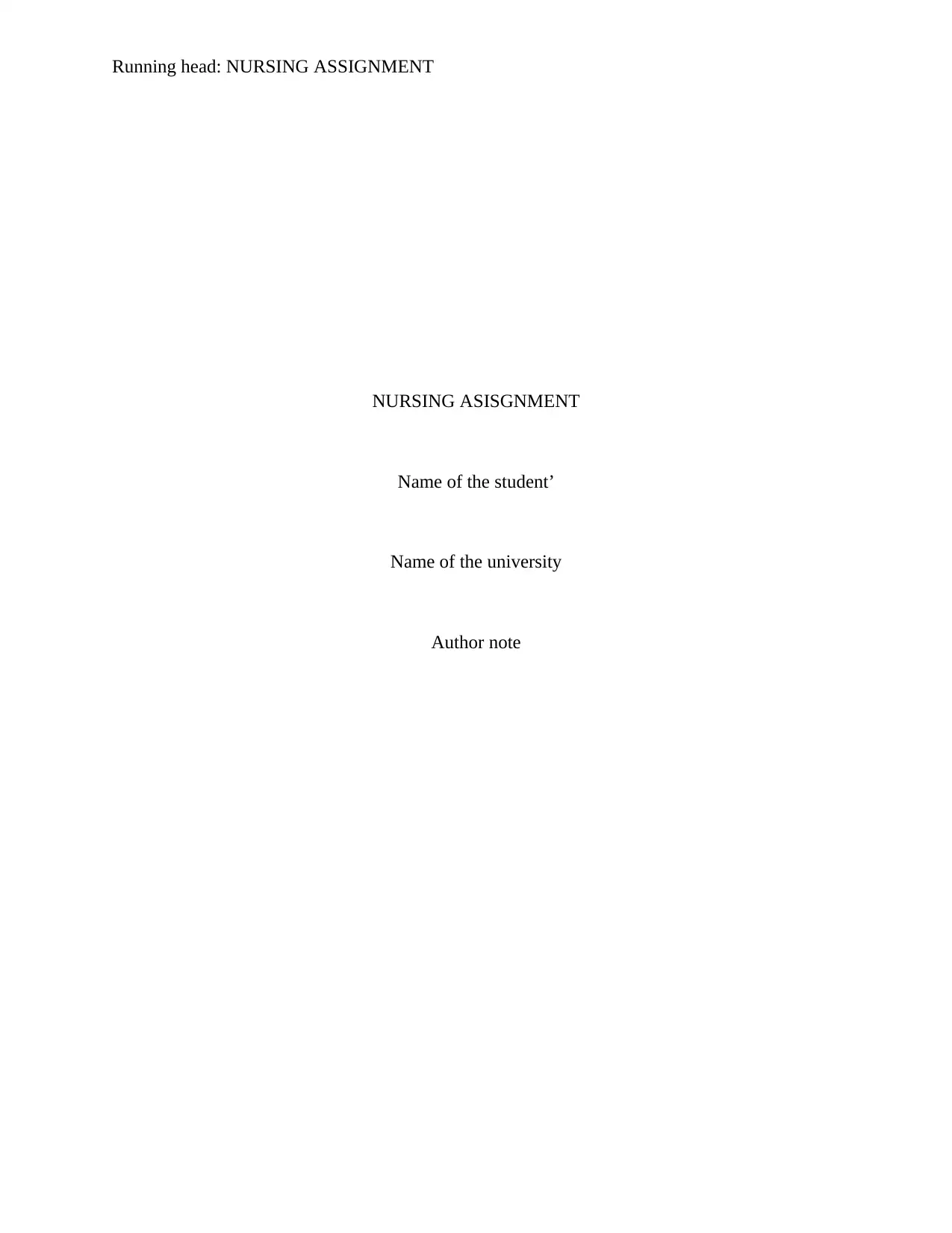
Running head: NURSING ASSIGNMENT
NURSING ASISGNMENT
Name of the student’
Name of the university
Author note
NURSING ASISGNMENT
Name of the student’
Name of the university
Author note
Paraphrase This Document
Need a fresh take? Get an instant paraphrase of this document with our AI Paraphraser
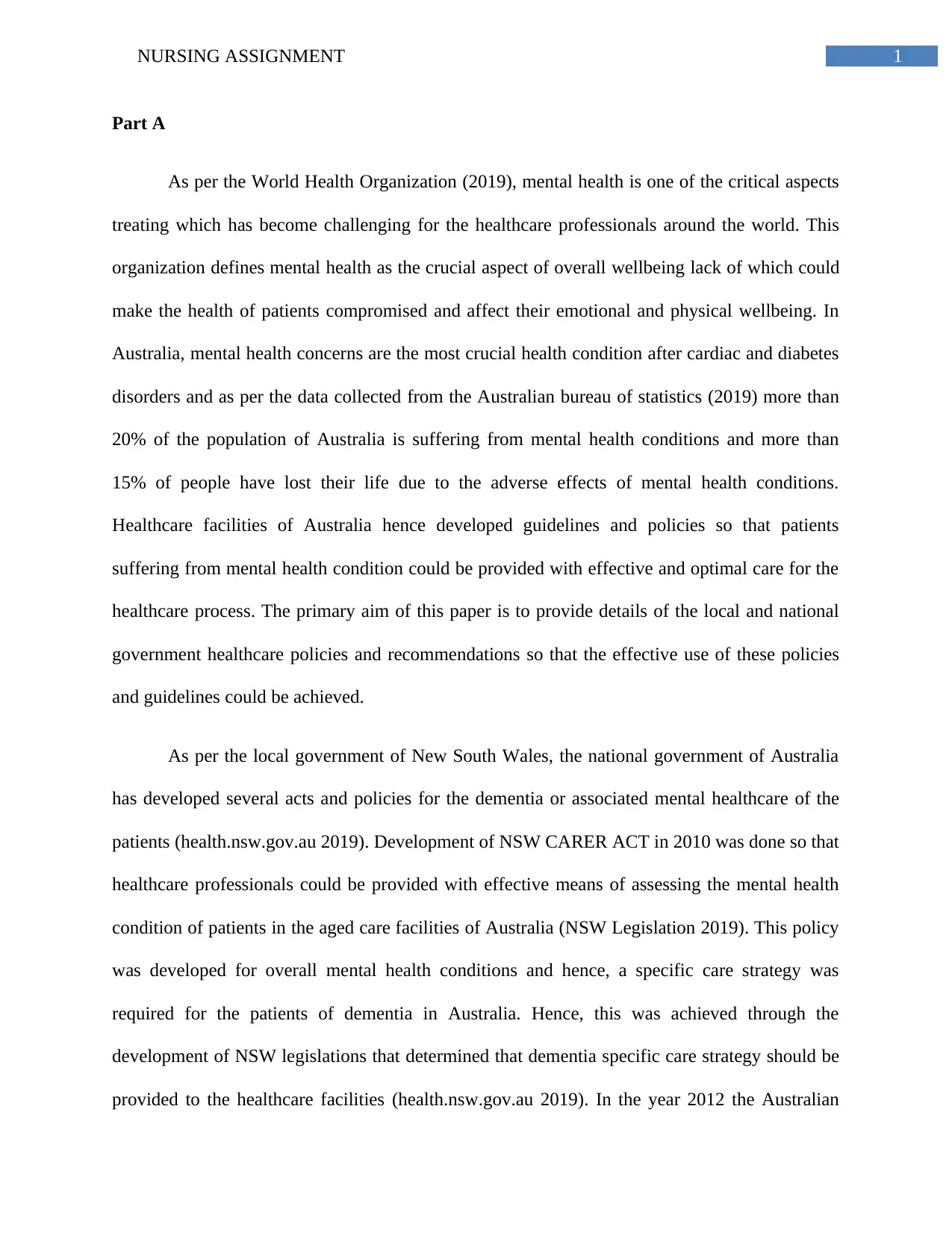
1NURSING ASSIGNMENT
Part A
As per the World Health Organization (2019), mental health is one of the critical aspects
treating which has become challenging for the healthcare professionals around the world. This
organization defines mental health as the crucial aspect of overall wellbeing lack of which could
make the health of patients compromised and affect their emotional and physical wellbeing. In
Australia, mental health concerns are the most crucial health condition after cardiac and diabetes
disorders and as per the data collected from the Australian bureau of statistics (2019) more than
20% of the population of Australia is suffering from mental health conditions and more than
15% of people have lost their life due to the adverse effects of mental health conditions.
Healthcare facilities of Australia hence developed guidelines and policies so that patients
suffering from mental health condition could be provided with effective and optimal care for the
healthcare process. The primary aim of this paper is to provide details of the local and national
government healthcare policies and recommendations so that the effective use of these policies
and guidelines could be achieved.
As per the local government of New South Wales, the national government of Australia
has developed several acts and policies for the dementia or associated mental healthcare of the
patients (health.nsw.gov.au 2019). Development of NSW CARER ACT in 2010 was done so that
healthcare professionals could be provided with effective means of assessing the mental health
condition of patients in the aged care facilities of Australia (NSW Legislation 2019). This policy
was developed for overall mental health conditions and hence, a specific care strategy was
required for the patients of dementia in Australia. Hence, this was achieved through the
development of NSW legislations that determined that dementia specific care strategy should be
provided to the healthcare facilities (health.nsw.gov.au 2019). In the year 2012 the Australian
Part A
As per the World Health Organization (2019), mental health is one of the critical aspects
treating which has become challenging for the healthcare professionals around the world. This
organization defines mental health as the crucial aspect of overall wellbeing lack of which could
make the health of patients compromised and affect their emotional and physical wellbeing. In
Australia, mental health concerns are the most crucial health condition after cardiac and diabetes
disorders and as per the data collected from the Australian bureau of statistics (2019) more than
20% of the population of Australia is suffering from mental health conditions and more than
15% of people have lost their life due to the adverse effects of mental health conditions.
Healthcare facilities of Australia hence developed guidelines and policies so that patients
suffering from mental health condition could be provided with effective and optimal care for the
healthcare process. The primary aim of this paper is to provide details of the local and national
government healthcare policies and recommendations so that the effective use of these policies
and guidelines could be achieved.
As per the local government of New South Wales, the national government of Australia
has developed several acts and policies for the dementia or associated mental healthcare of the
patients (health.nsw.gov.au 2019). Development of NSW CARER ACT in 2010 was done so that
healthcare professionals could be provided with effective means of assessing the mental health
condition of patients in the aged care facilities of Australia (NSW Legislation 2019). This policy
was developed for overall mental health conditions and hence, a specific care strategy was
required for the patients of dementia in Australia. Hence, this was achieved through the
development of NSW legislations that determined that dementia specific care strategy should be
provided to the healthcare facilities (health.nsw.gov.au 2019). In the year 2012 the Australian
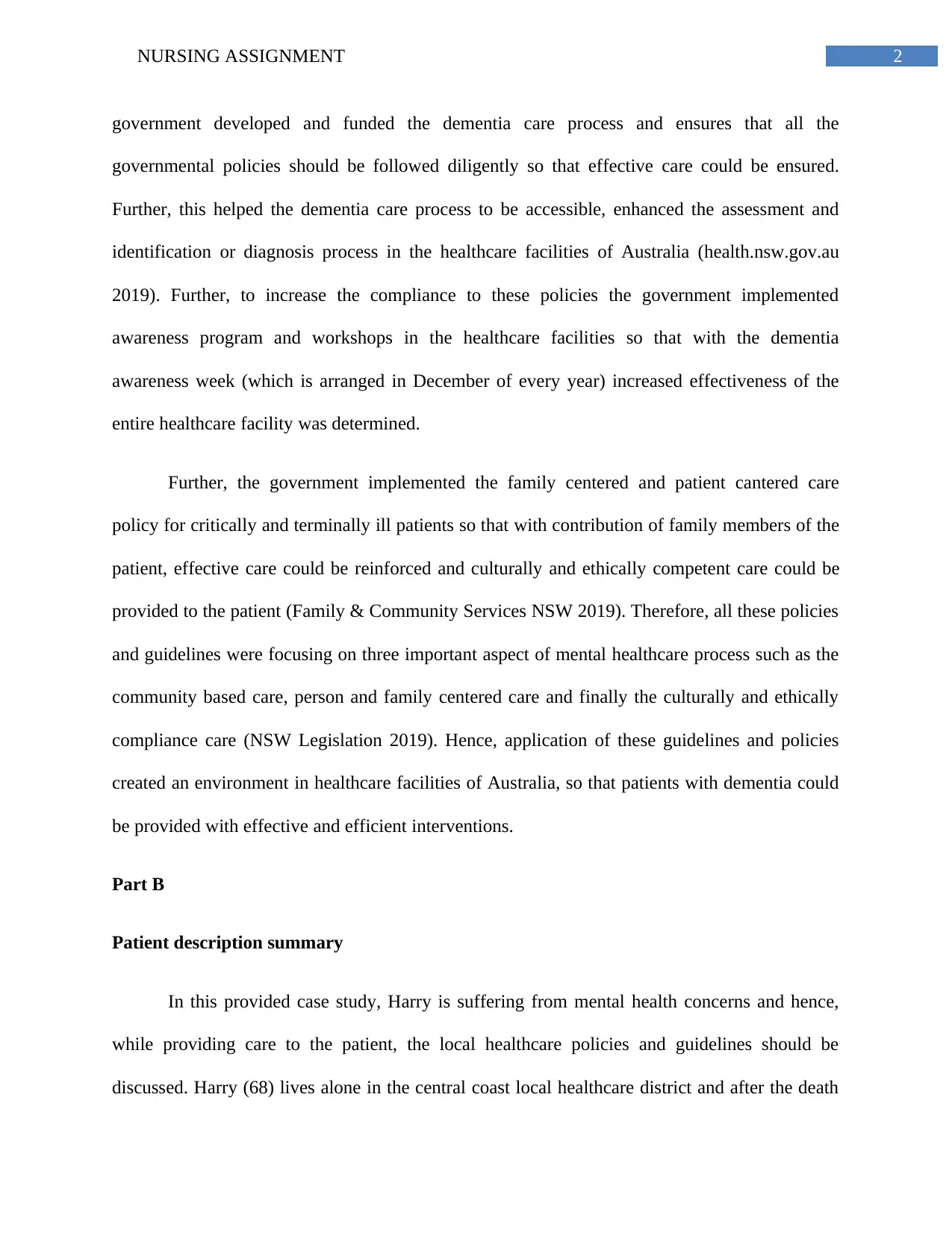
2NURSING ASSIGNMENT
government developed and funded the dementia care process and ensures that all the
governmental policies should be followed diligently so that effective care could be ensured.
Further, this helped the dementia care process to be accessible, enhanced the assessment and
identification or diagnosis process in the healthcare facilities of Australia (health.nsw.gov.au
2019). Further, to increase the compliance to these policies the government implemented
awareness program and workshops in the healthcare facilities so that with the dementia
awareness week (which is arranged in December of every year) increased effectiveness of the
entire healthcare facility was determined.
Further, the government implemented the family centered and patient cantered care
policy for critically and terminally ill patients so that with contribution of family members of the
patient, effective care could be reinforced and culturally and ethically competent care could be
provided to the patient (Family & Community Services NSW 2019). Therefore, all these policies
and guidelines were focusing on three important aspect of mental healthcare process such as the
community based care, person and family centered care and finally the culturally and ethically
compliance care (NSW Legislation 2019). Hence, application of these guidelines and policies
created an environment in healthcare facilities of Australia, so that patients with dementia could
be provided with effective and efficient interventions.
Part B
Patient description summary
In this provided case study, Harry is suffering from mental health concerns and hence,
while providing care to the patient, the local healthcare policies and guidelines should be
discussed. Harry (68) lives alone in the central coast local healthcare district and after the death
government developed and funded the dementia care process and ensures that all the
governmental policies should be followed diligently so that effective care could be ensured.
Further, this helped the dementia care process to be accessible, enhanced the assessment and
identification or diagnosis process in the healthcare facilities of Australia (health.nsw.gov.au
2019). Further, to increase the compliance to these policies the government implemented
awareness program and workshops in the healthcare facilities so that with the dementia
awareness week (which is arranged in December of every year) increased effectiveness of the
entire healthcare facility was determined.
Further, the government implemented the family centered and patient cantered care
policy for critically and terminally ill patients so that with contribution of family members of the
patient, effective care could be reinforced and culturally and ethically competent care could be
provided to the patient (Family & Community Services NSW 2019). Therefore, all these policies
and guidelines were focusing on three important aspect of mental healthcare process such as the
community based care, person and family centered care and finally the culturally and ethically
compliance care (NSW Legislation 2019). Hence, application of these guidelines and policies
created an environment in healthcare facilities of Australia, so that patients with dementia could
be provided with effective and efficient interventions.
Part B
Patient description summary
In this provided case study, Harry is suffering from mental health concerns and hence,
while providing care to the patient, the local healthcare policies and guidelines should be
discussed. Harry (68) lives alone in the central coast local healthcare district and after the death
⊘ This is a preview!⊘
Do you want full access?
Subscribe today to unlock all pages.

Trusted by 1+ million students worldwide
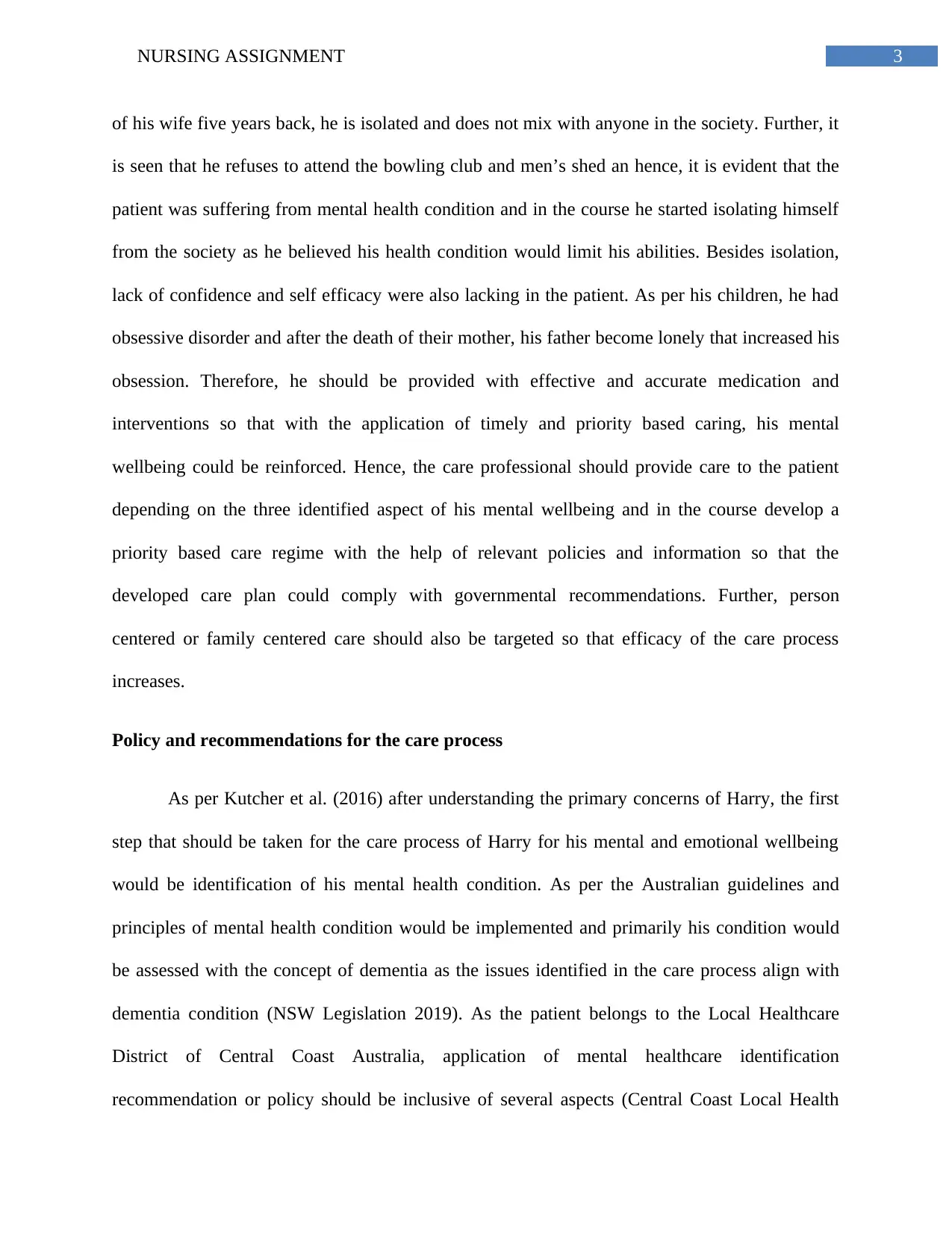
3NURSING ASSIGNMENT
of his wife five years back, he is isolated and does not mix with anyone in the society. Further, it
is seen that he refuses to attend the bowling club and men’s shed an hence, it is evident that the
patient was suffering from mental health condition and in the course he started isolating himself
from the society as he believed his health condition would limit his abilities. Besides isolation,
lack of confidence and self efficacy were also lacking in the patient. As per his children, he had
obsessive disorder and after the death of their mother, his father become lonely that increased his
obsession. Therefore, he should be provided with effective and accurate medication and
interventions so that with the application of timely and priority based caring, his mental
wellbeing could be reinforced. Hence, the care professional should provide care to the patient
depending on the three identified aspect of his mental wellbeing and in the course develop a
priority based care regime with the help of relevant policies and information so that the
developed care plan could comply with governmental recommendations. Further, person
centered or family centered care should also be targeted so that efficacy of the care process
increases.
Policy and recommendations for the care process
As per Kutcher et al. (2016) after understanding the primary concerns of Harry, the first
step that should be taken for the care process of Harry for his mental and emotional wellbeing
would be identification of his mental health condition. As per the Australian guidelines and
principles of mental health condition would be implemented and primarily his condition would
be assessed with the concept of dementia as the issues identified in the care process align with
dementia condition (NSW Legislation 2019). As the patient belongs to the Local Healthcare
District of Central Coast Australia, application of mental healthcare identification
recommendation or policy should be inclusive of several aspects (Central Coast Local Health
of his wife five years back, he is isolated and does not mix with anyone in the society. Further, it
is seen that he refuses to attend the bowling club and men’s shed an hence, it is evident that the
patient was suffering from mental health condition and in the course he started isolating himself
from the society as he believed his health condition would limit his abilities. Besides isolation,
lack of confidence and self efficacy were also lacking in the patient. As per his children, he had
obsessive disorder and after the death of their mother, his father become lonely that increased his
obsession. Therefore, he should be provided with effective and accurate medication and
interventions so that with the application of timely and priority based caring, his mental
wellbeing could be reinforced. Hence, the care professional should provide care to the patient
depending on the three identified aspect of his mental wellbeing and in the course develop a
priority based care regime with the help of relevant policies and information so that the
developed care plan could comply with governmental recommendations. Further, person
centered or family centered care should also be targeted so that efficacy of the care process
increases.
Policy and recommendations for the care process
As per Kutcher et al. (2016) after understanding the primary concerns of Harry, the first
step that should be taken for the care process of Harry for his mental and emotional wellbeing
would be identification of his mental health condition. As per the Australian guidelines and
principles of mental health condition would be implemented and primarily his condition would
be assessed with the concept of dementia as the issues identified in the care process align with
dementia condition (NSW Legislation 2019). As the patient belongs to the Local Healthcare
District of Central Coast Australia, application of mental healthcare identification
recommendation or policy should be inclusive of several aspects (Central Coast Local Health
Paraphrase This Document
Need a fresh take? Get an instant paraphrase of this document with our AI Paraphraser
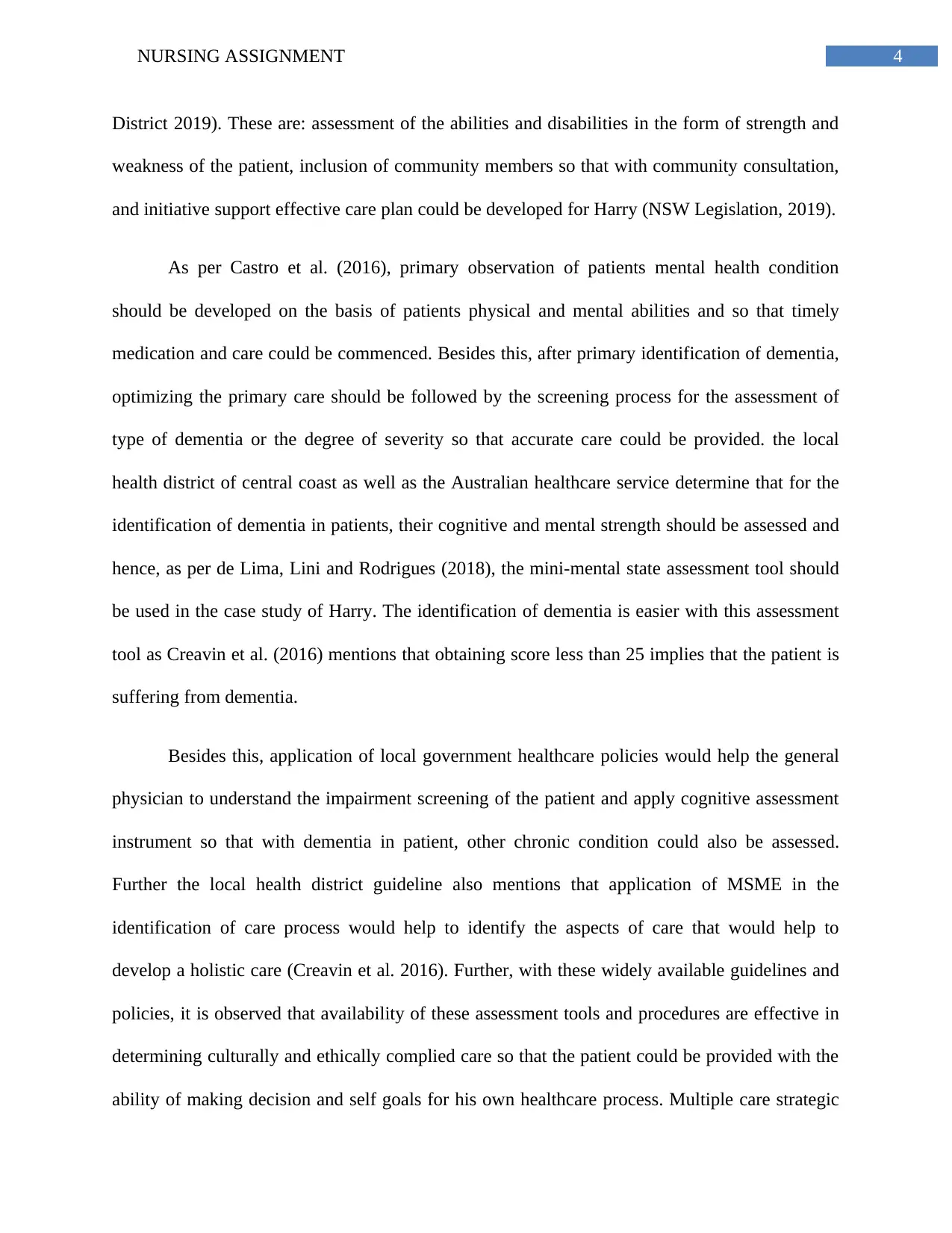
4NURSING ASSIGNMENT
District 2019). These are: assessment of the abilities and disabilities in the form of strength and
weakness of the patient, inclusion of community members so that with community consultation,
and initiative support effective care plan could be developed for Harry (NSW Legislation, 2019).
As per Castro et al. (2016), primary observation of patients mental health condition
should be developed on the basis of patients physical and mental abilities and so that timely
medication and care could be commenced. Besides this, after primary identification of dementia,
optimizing the primary care should be followed by the screening process for the assessment of
type of dementia or the degree of severity so that accurate care could be provided. the local
health district of central coast as well as the Australian healthcare service determine that for the
identification of dementia in patients, their cognitive and mental strength should be assessed and
hence, as per de Lima, Lini and Rodrigues (2018), the mini-mental state assessment tool should
be used in the case study of Harry. The identification of dementia is easier with this assessment
tool as Creavin et al. (2016) mentions that obtaining score less than 25 implies that the patient is
suffering from dementia.
Besides this, application of local government healthcare policies would help the general
physician to understand the impairment screening of the patient and apply cognitive assessment
instrument so that with dementia in patient, other chronic condition could also be assessed.
Further the local health district guideline also mentions that application of MSME in the
identification of care process would help to identify the aspects of care that would help to
develop a holistic care (Creavin et al. 2016). Further, with these widely available guidelines and
policies, it is observed that availability of these assessment tools and procedures are effective in
determining culturally and ethically complied care so that the patient could be provided with the
ability of making decision and self goals for his own healthcare process. Multiple care strategic
District 2019). These are: assessment of the abilities and disabilities in the form of strength and
weakness of the patient, inclusion of community members so that with community consultation,
and initiative support effective care plan could be developed for Harry (NSW Legislation, 2019).
As per Castro et al. (2016), primary observation of patients mental health condition
should be developed on the basis of patients physical and mental abilities and so that timely
medication and care could be commenced. Besides this, after primary identification of dementia,
optimizing the primary care should be followed by the screening process for the assessment of
type of dementia or the degree of severity so that accurate care could be provided. the local
health district of central coast as well as the Australian healthcare service determine that for the
identification of dementia in patients, their cognitive and mental strength should be assessed and
hence, as per de Lima, Lini and Rodrigues (2018), the mini-mental state assessment tool should
be used in the case study of Harry. The identification of dementia is easier with this assessment
tool as Creavin et al. (2016) mentions that obtaining score less than 25 implies that the patient is
suffering from dementia.
Besides this, application of local government healthcare policies would help the general
physician to understand the impairment screening of the patient and apply cognitive assessment
instrument so that with dementia in patient, other chronic condition could also be assessed.
Further the local health district guideline also mentions that application of MSME in the
identification of care process would help to identify the aspects of care that would help to
develop a holistic care (Creavin et al. 2016). Further, with these widely available guidelines and
policies, it is observed that availability of these assessment tools and procedures are effective in
determining culturally and ethically complied care so that the patient could be provided with the
ability of making decision and self goals for his own healthcare process. Multiple care strategic
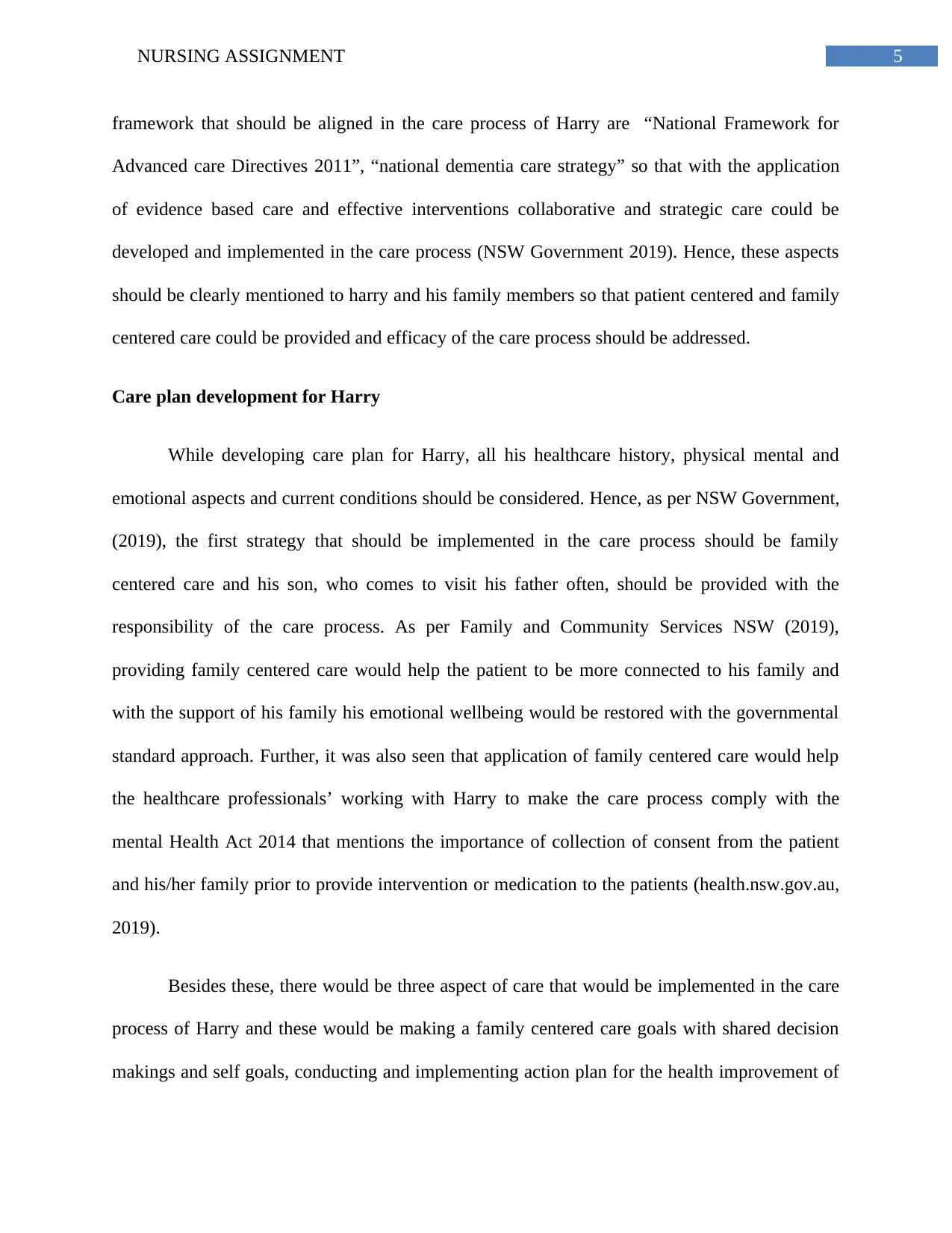
5NURSING ASSIGNMENT
framework that should be aligned in the care process of Harry are “National Framework for
Advanced care Directives 2011”, “national dementia care strategy” so that with the application
of evidence based care and effective interventions collaborative and strategic care could be
developed and implemented in the care process (NSW Government 2019). Hence, these aspects
should be clearly mentioned to harry and his family members so that patient centered and family
centered care could be provided and efficacy of the care process should be addressed.
Care plan development for Harry
While developing care plan for Harry, all his healthcare history, physical mental and
emotional aspects and current conditions should be considered. Hence, as per NSW Government,
(2019), the first strategy that should be implemented in the care process should be family
centered care and his son, who comes to visit his father often, should be provided with the
responsibility of the care process. As per Family and Community Services NSW (2019),
providing family centered care would help the patient to be more connected to his family and
with the support of his family his emotional wellbeing would be restored with the governmental
standard approach. Further, it was also seen that application of family centered care would help
the healthcare professionals’ working with Harry to make the care process comply with the
mental Health Act 2014 that mentions the importance of collection of consent from the patient
and his/her family prior to provide intervention or medication to the patients (health.nsw.gov.au,
2019).
Besides these, there would be three aspect of care that would be implemented in the care
process of Harry and these would be making a family centered care goals with shared decision
makings and self goals, conducting and implementing action plan for the health improvement of
framework that should be aligned in the care process of Harry are “National Framework for
Advanced care Directives 2011”, “national dementia care strategy” so that with the application
of evidence based care and effective interventions collaborative and strategic care could be
developed and implemented in the care process (NSW Government 2019). Hence, these aspects
should be clearly mentioned to harry and his family members so that patient centered and family
centered care could be provided and efficacy of the care process should be addressed.
Care plan development for Harry
While developing care plan for Harry, all his healthcare history, physical mental and
emotional aspects and current conditions should be considered. Hence, as per NSW Government,
(2019), the first strategy that should be implemented in the care process should be family
centered care and his son, who comes to visit his father often, should be provided with the
responsibility of the care process. As per Family and Community Services NSW (2019),
providing family centered care would help the patient to be more connected to his family and
with the support of his family his emotional wellbeing would be restored with the governmental
standard approach. Further, it was also seen that application of family centered care would help
the healthcare professionals’ working with Harry to make the care process comply with the
mental Health Act 2014 that mentions the importance of collection of consent from the patient
and his/her family prior to provide intervention or medication to the patients (health.nsw.gov.au,
2019).
Besides these, there would be three aspect of care that would be implemented in the care
process of Harry and these would be making a family centered care goals with shared decision
makings and self goals, conducting and implementing action plan for the health improvement of
⊘ This is a preview!⊘
Do you want full access?
Subscribe today to unlock all pages.

Trusted by 1+ million students worldwide
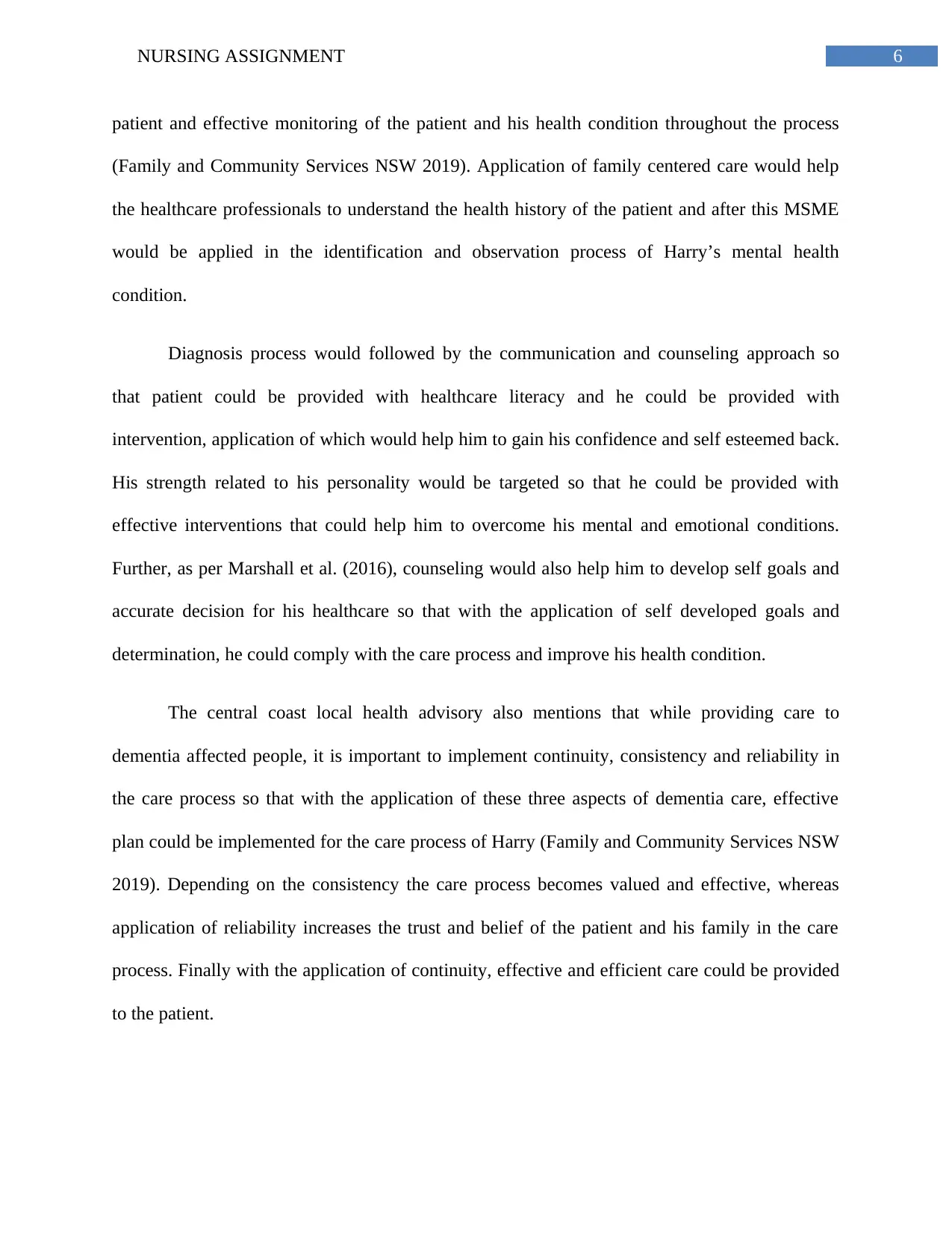
6NURSING ASSIGNMENT
patient and effective monitoring of the patient and his health condition throughout the process
(Family and Community Services NSW 2019). Application of family centered care would help
the healthcare professionals to understand the health history of the patient and after this MSME
would be applied in the identification and observation process of Harry’s mental health
condition.
Diagnosis process would followed by the communication and counseling approach so
that patient could be provided with healthcare literacy and he could be provided with
intervention, application of which would help him to gain his confidence and self esteemed back.
His strength related to his personality would be targeted so that he could be provided with
effective interventions that could help him to overcome his mental and emotional conditions.
Further, as per Marshall et al. (2016), counseling would also help him to develop self goals and
accurate decision for his healthcare so that with the application of self developed goals and
determination, he could comply with the care process and improve his health condition.
The central coast local health advisory also mentions that while providing care to
dementia affected people, it is important to implement continuity, consistency and reliability in
the care process so that with the application of these three aspects of dementia care, effective
plan could be implemented for the care process of Harry (Family and Community Services NSW
2019). Depending on the consistency the care process becomes valued and effective, whereas
application of reliability increases the trust and belief of the patient and his family in the care
process. Finally with the application of continuity, effective and efficient care could be provided
to the patient.
patient and effective monitoring of the patient and his health condition throughout the process
(Family and Community Services NSW 2019). Application of family centered care would help
the healthcare professionals to understand the health history of the patient and after this MSME
would be applied in the identification and observation process of Harry’s mental health
condition.
Diagnosis process would followed by the communication and counseling approach so
that patient could be provided with healthcare literacy and he could be provided with
intervention, application of which would help him to gain his confidence and self esteemed back.
His strength related to his personality would be targeted so that he could be provided with
effective interventions that could help him to overcome his mental and emotional conditions.
Further, as per Marshall et al. (2016), counseling would also help him to develop self goals and
accurate decision for his healthcare so that with the application of self developed goals and
determination, he could comply with the care process and improve his health condition.
The central coast local health advisory also mentions that while providing care to
dementia affected people, it is important to implement continuity, consistency and reliability in
the care process so that with the application of these three aspects of dementia care, effective
plan could be implemented for the care process of Harry (Family and Community Services NSW
2019). Depending on the consistency the care process becomes valued and effective, whereas
application of reliability increases the trust and belief of the patient and his family in the care
process. Finally with the application of continuity, effective and efficient care could be provided
to the patient.
Paraphrase This Document
Need a fresh take? Get an instant paraphrase of this document with our AI Paraphraser
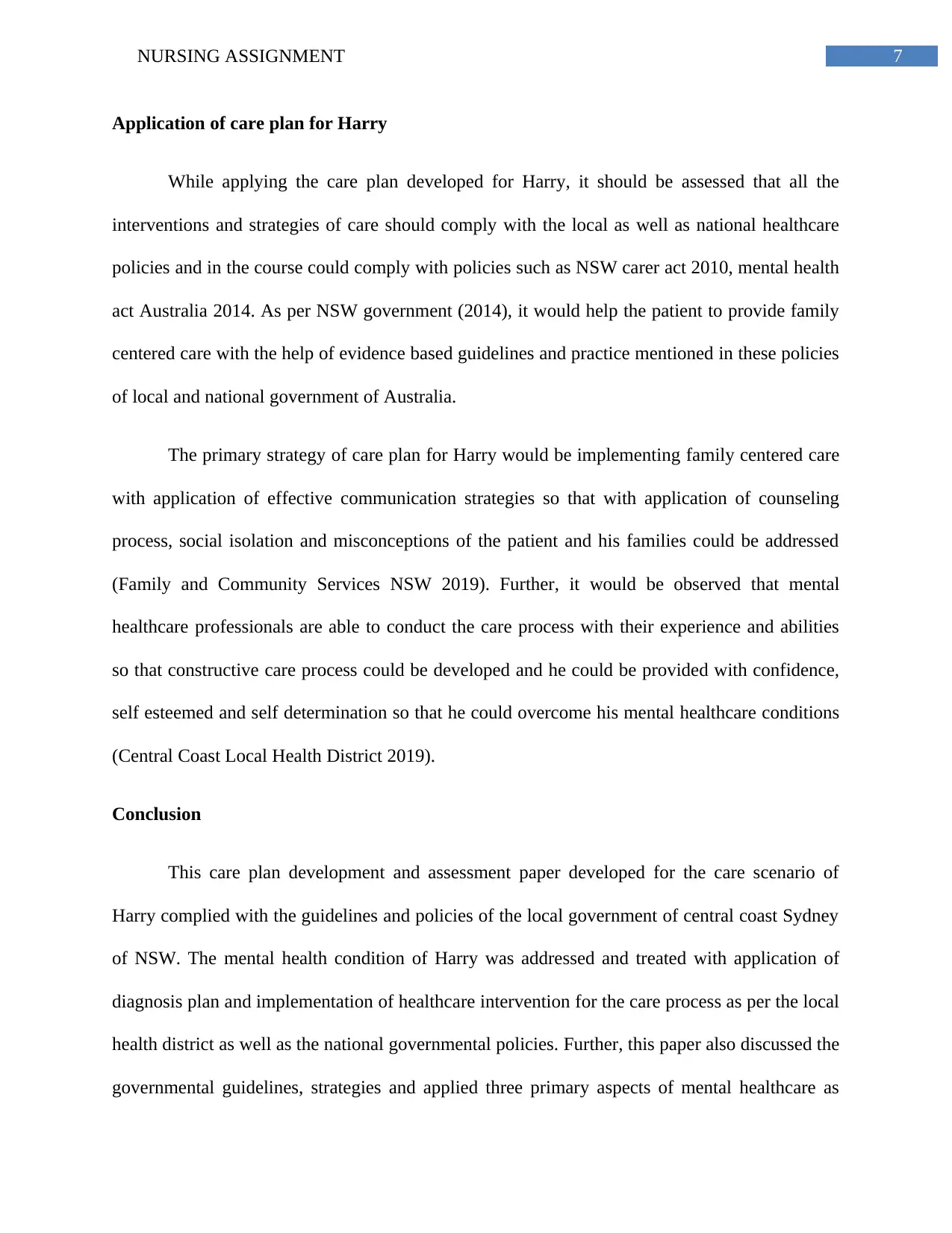
7NURSING ASSIGNMENT
Application of care plan for Harry
While applying the care plan developed for Harry, it should be assessed that all the
interventions and strategies of care should comply with the local as well as national healthcare
policies and in the course could comply with policies such as NSW carer act 2010, mental health
act Australia 2014. As per NSW government (2014), it would help the patient to provide family
centered care with the help of evidence based guidelines and practice mentioned in these policies
of local and national government of Australia.
The primary strategy of care plan for Harry would be implementing family centered care
with application of effective communication strategies so that with application of counseling
process, social isolation and misconceptions of the patient and his families could be addressed
(Family and Community Services NSW 2019). Further, it would be observed that mental
healthcare professionals are able to conduct the care process with their experience and abilities
so that constructive care process could be developed and he could be provided with confidence,
self esteemed and self determination so that he could overcome his mental healthcare conditions
(Central Coast Local Health District 2019).
Conclusion
This care plan development and assessment paper developed for the care scenario of
Harry complied with the guidelines and policies of the local government of central coast Sydney
of NSW. The mental health condition of Harry was addressed and treated with application of
diagnosis plan and implementation of healthcare intervention for the care process as per the local
health district as well as the national governmental policies. Further, this paper also discussed the
governmental guidelines, strategies and applied three primary aspects of mental healthcare as
Application of care plan for Harry
While applying the care plan developed for Harry, it should be assessed that all the
interventions and strategies of care should comply with the local as well as national healthcare
policies and in the course could comply with policies such as NSW carer act 2010, mental health
act Australia 2014. As per NSW government (2014), it would help the patient to provide family
centered care with the help of evidence based guidelines and practice mentioned in these policies
of local and national government of Australia.
The primary strategy of care plan for Harry would be implementing family centered care
with application of effective communication strategies so that with application of counseling
process, social isolation and misconceptions of the patient and his families could be addressed
(Family and Community Services NSW 2019). Further, it would be observed that mental
healthcare professionals are able to conduct the care process with their experience and abilities
so that constructive care process could be developed and he could be provided with confidence,
self esteemed and self determination so that he could overcome his mental healthcare conditions
(Central Coast Local Health District 2019).
Conclusion
This care plan development and assessment paper developed for the care scenario of
Harry complied with the guidelines and policies of the local government of central coast Sydney
of NSW. The mental health condition of Harry was addressed and treated with application of
diagnosis plan and implementation of healthcare intervention for the care process as per the local
health district as well as the national governmental policies. Further, this paper also discussed the
governmental guidelines, strategies and applied three primary aspects of mental healthcare as

8NURSING ASSIGNMENT
mentioned by the NSW that helped to implement effective interventions for the care or Harry
and his mental health condition.
mentioned by the NSW that helped to implement effective interventions for the care or Harry
and his mental health condition.
⊘ This is a preview!⊘
Do you want full access?
Subscribe today to unlock all pages.

Trusted by 1+ million students worldwide
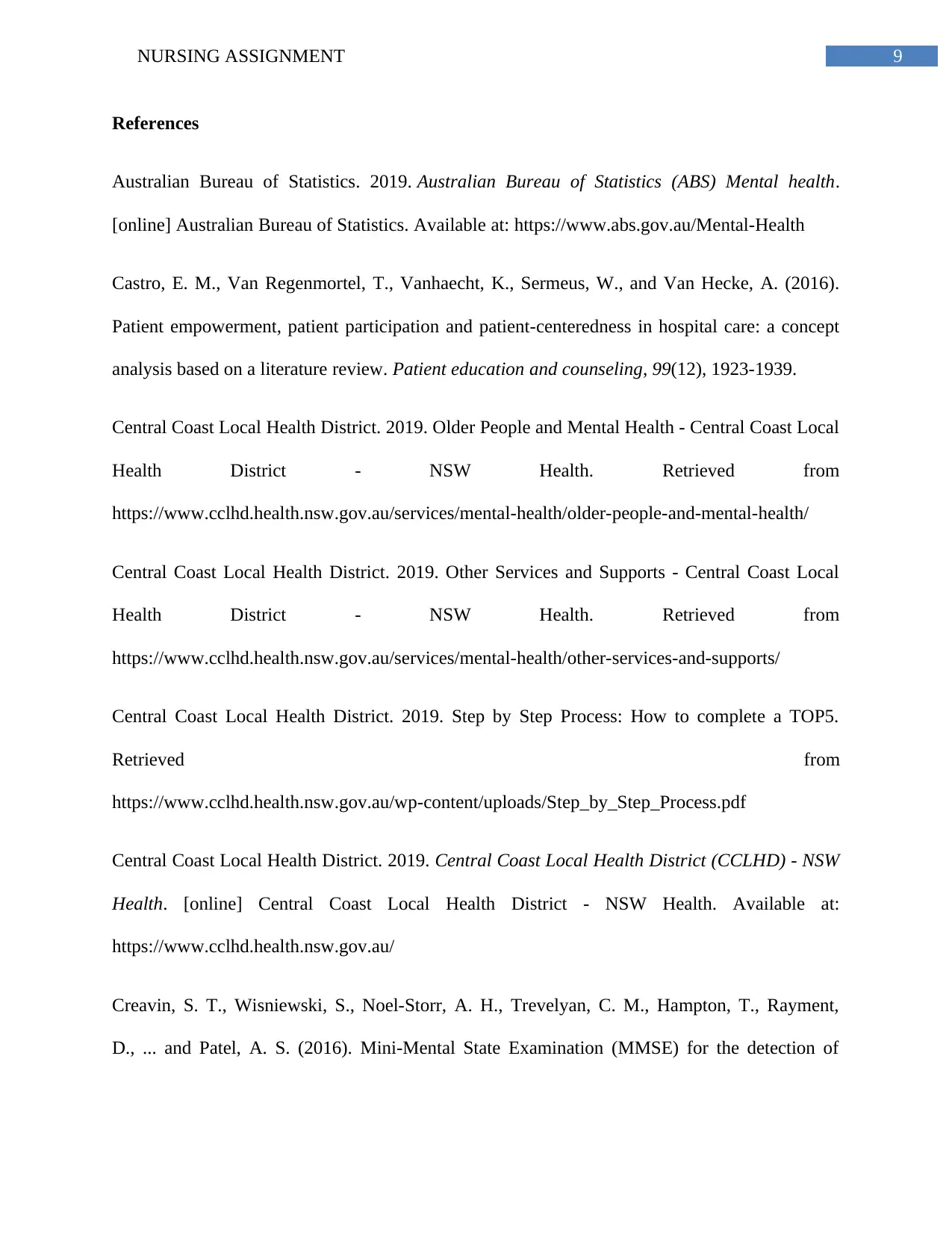
9NURSING ASSIGNMENT
References
Australian Bureau of Statistics. 2019. Australian Bureau of Statistics (ABS) Mental health.
[online] Australian Bureau of Statistics. Available at: https://www.abs.gov.au/Mental-Health
Castro, E. M., Van Regenmortel, T., Vanhaecht, K., Sermeus, W., and Van Hecke, A. (2016).
Patient empowerment, patient participation and patient-centeredness in hospital care: a concept
analysis based on a literature review. Patient education and counseling, 99(12), 1923-1939.
Central Coast Local Health District. 2019. Older People and Mental Health - Central Coast Local
Health District - NSW Health. Retrieved from
https://www.cclhd.health.nsw.gov.au/services/mental-health/older-people-and-mental-health/
Central Coast Local Health District. 2019. Other Services and Supports - Central Coast Local
Health District - NSW Health. Retrieved from
https://www.cclhd.health.nsw.gov.au/services/mental-health/other-services-and-supports/
Central Coast Local Health District. 2019. Step by Step Process: How to complete a TOP5.
Retrieved from
https://www.cclhd.health.nsw.gov.au/wp-content/uploads/Step_by_Step_Process.pdf
Central Coast Local Health District. 2019. Central Coast Local Health District (CCLHD) - NSW
Health. [online] Central Coast Local Health District - NSW Health. Available at:
https://www.cclhd.health.nsw.gov.au/
Creavin, S. T., Wisniewski, S., Noel‐Storr, A. H., Trevelyan, C. M., Hampton, T., Rayment,
D., ... and Patel, A. S. (2016). Mini‐Mental State Examination (MMSE) for the detection of
References
Australian Bureau of Statistics. 2019. Australian Bureau of Statistics (ABS) Mental health.
[online] Australian Bureau of Statistics. Available at: https://www.abs.gov.au/Mental-Health
Castro, E. M., Van Regenmortel, T., Vanhaecht, K., Sermeus, W., and Van Hecke, A. (2016).
Patient empowerment, patient participation and patient-centeredness in hospital care: a concept
analysis based on a literature review. Patient education and counseling, 99(12), 1923-1939.
Central Coast Local Health District. 2019. Older People and Mental Health - Central Coast Local
Health District - NSW Health. Retrieved from
https://www.cclhd.health.nsw.gov.au/services/mental-health/older-people-and-mental-health/
Central Coast Local Health District. 2019. Other Services and Supports - Central Coast Local
Health District - NSW Health. Retrieved from
https://www.cclhd.health.nsw.gov.au/services/mental-health/other-services-and-supports/
Central Coast Local Health District. 2019. Step by Step Process: How to complete a TOP5.
Retrieved from
https://www.cclhd.health.nsw.gov.au/wp-content/uploads/Step_by_Step_Process.pdf
Central Coast Local Health District. 2019. Central Coast Local Health District (CCLHD) - NSW
Health. [online] Central Coast Local Health District - NSW Health. Available at:
https://www.cclhd.health.nsw.gov.au/
Creavin, S. T., Wisniewski, S., Noel‐Storr, A. H., Trevelyan, C. M., Hampton, T., Rayment,
D., ... and Patel, A. S. (2016). Mini‐Mental State Examination (MMSE) for the detection of
Paraphrase This Document
Need a fresh take? Get an instant paraphrase of this document with our AI Paraphraser
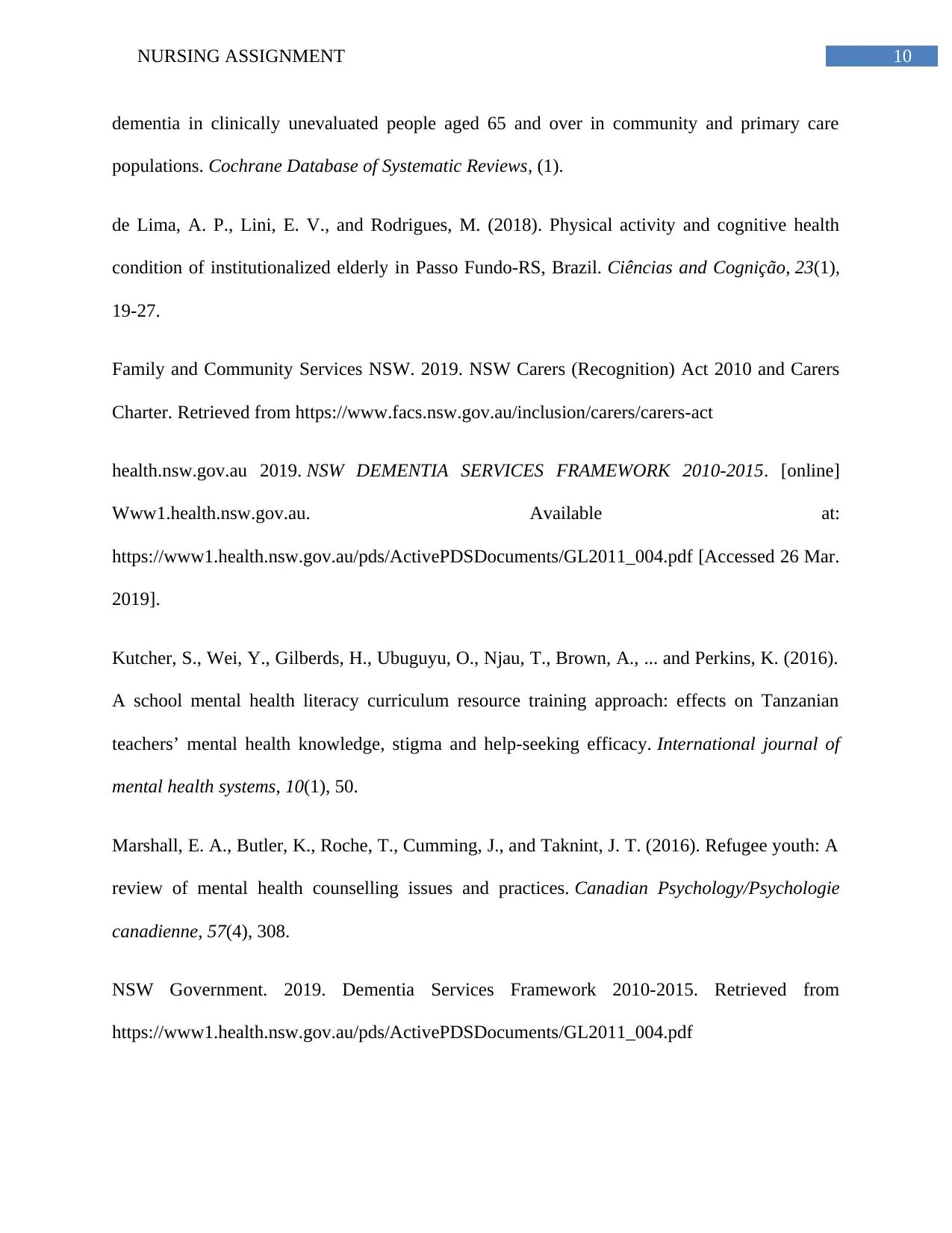
10NURSING ASSIGNMENT
dementia in clinically unevaluated people aged 65 and over in community and primary care
populations. Cochrane Database of Systematic Reviews, (1).
de Lima, A. P., Lini, E. V., and Rodrigues, M. (2018). Physical activity and cognitive health
condition of institutionalized elderly in Passo Fundo-RS, Brazil. Ciências and Cognição, 23(1),
19-27.
Family and Community Services NSW. 2019. NSW Carers (Recognition) Act 2010 and Carers
Charter. Retrieved from https://www.facs.nsw.gov.au/inclusion/carers/carers-act
health.nsw.gov.au 2019. NSW DEMENTIA SERVICES FRAMEWORK 2010-2015. [online]
Www1.health.nsw.gov.au. Available at:
https://www1.health.nsw.gov.au/pds/ActivePDSDocuments/GL2011_004.pdf [Accessed 26 Mar.
2019].
Kutcher, S., Wei, Y., Gilberds, H., Ubuguyu, O., Njau, T., Brown, A., ... and Perkins, K. (2016).
A school mental health literacy curriculum resource training approach: effects on Tanzanian
teachers’ mental health knowledge, stigma and help-seeking efficacy. International journal of
mental health systems, 10(1), 50.
Marshall, E. A., Butler, K., Roche, T., Cumming, J., and Taknint, J. T. (2016). Refugee youth: A
review of mental health counselling issues and practices. Canadian Psychology/Psychologie
canadienne, 57(4), 308.
NSW Government. 2019. Dementia Services Framework 2010-2015. Retrieved from
https://www1.health.nsw.gov.au/pds/ActivePDSDocuments/GL2011_004.pdf
dementia in clinically unevaluated people aged 65 and over in community and primary care
populations. Cochrane Database of Systematic Reviews, (1).
de Lima, A. P., Lini, E. V., and Rodrigues, M. (2018). Physical activity and cognitive health
condition of institutionalized elderly in Passo Fundo-RS, Brazil. Ciências and Cognição, 23(1),
19-27.
Family and Community Services NSW. 2019. NSW Carers (Recognition) Act 2010 and Carers
Charter. Retrieved from https://www.facs.nsw.gov.au/inclusion/carers/carers-act
health.nsw.gov.au 2019. NSW DEMENTIA SERVICES FRAMEWORK 2010-2015. [online]
Www1.health.nsw.gov.au. Available at:
https://www1.health.nsw.gov.au/pds/ActivePDSDocuments/GL2011_004.pdf [Accessed 26 Mar.
2019].
Kutcher, S., Wei, Y., Gilberds, H., Ubuguyu, O., Njau, T., Brown, A., ... and Perkins, K. (2016).
A school mental health literacy curriculum resource training approach: effects on Tanzanian
teachers’ mental health knowledge, stigma and help-seeking efficacy. International journal of
mental health systems, 10(1), 50.
Marshall, E. A., Butler, K., Roche, T., Cumming, J., and Taknint, J. T. (2016). Refugee youth: A
review of mental health counselling issues and practices. Canadian Psychology/Psychologie
canadienne, 57(4), 308.
NSW Government. 2019. Dementia Services Framework 2010-2015. Retrieved from
https://www1.health.nsw.gov.au/pds/ActivePDSDocuments/GL2011_004.pdf

11NURSING ASSIGNMENT
NSW Legislation. 2019. NSW Legislation. Retrieved from
https://www.legislation.nsw.gov.au/#/view/act/2010/20/full
World Health Organization. 2019. World Health Organization (WHO) Mental health. [online]
World Health Organization. Available at: https://www.who.int/mental_health/en/
NSW Legislation. 2019. NSW Legislation. Retrieved from
https://www.legislation.nsw.gov.au/#/view/act/2010/20/full
World Health Organization. 2019. World Health Organization (WHO) Mental health. [online]
World Health Organization. Available at: https://www.who.int/mental_health/en/
⊘ This is a preview!⊘
Do you want full access?
Subscribe today to unlock all pages.

Trusted by 1+ million students worldwide
1 out of 12
Related Documents
Your All-in-One AI-Powered Toolkit for Academic Success.
+13062052269
info@desklib.com
Available 24*7 on WhatsApp / Email
![[object Object]](/_next/static/media/star-bottom.7253800d.svg)
Unlock your academic potential
Copyright © 2020–2026 A2Z Services. All Rights Reserved. Developed and managed by ZUCOL.





